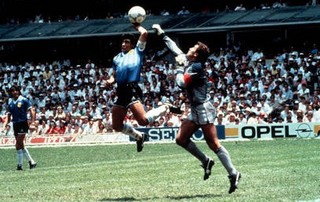When Goalkeepers Strike
By Paul

Even if you don’t like soccer you might find the following couple of videos educational and humorous;
Colombia goalkeeper scoring against Poland
Fabien Barthez, the ever peripatetic French goalkeeper who was rarely to be found in goal but mostly charged out to tackle opposing strikers.
Maradona’s nightmare ad; he was apparently paid $350,000, by brewer Guaraná for this TV ad, who again happens to be one of the main Brazilian national team sponsors.
Some Soccernomics;
Learning About Globalization By Watching A Soccer Game; Soccer is not only the world's most popular sport, but also probably its most globalized profession. It is inconceivable that Brazilian, Cameroonian or Japanese doctors, computer scientists, blue-collar workers, or bank tellers could move from one country to another as easily as Brazilian, Cameroonian or Japanese soccer players do.
Game theory and Soccer; According to data from 2,885 matches in Italy, England and Spain, a bad team playing at home is more likely to score than a good one playing away.
The Case of Penalty Kicks in Soccer; In Europe, Levitt is feted as one of the authors of the "penalty-kick paper". Probably only a trio of economists would have watched videos of 459 penalties taken in the French and Italian football leagues. The authors were testing a complex point of game theory. What they found was that the best place to put a penalty was the middle of the goal, largely because goalkeepers always dive. Yet few penalty-takers actually choose the middle. "I think one reason people don't is that it's just incredibly humiliating to a kicker if he kicks in the middle and doesn't score," guesses Levitt.
The Great World Cup ticket scandal and Red card for Fifa in World Cup tickets fiasco?
Football 'to deliver £1bn kick to spending'; WORLD CUP-related purchases are expected to boost total consumer spending by an extra 50 per cent to £3 billion during the month of the tournament.
On Choosing England’s Manager; The search for the next England manager highlights three problems faced by many organizations looking for a new boss: incommensurabilities, cognitive biases and groupthink. These problems mean it’s very hard to identify the “best” candidate.
Soccernomics 2006; The world economy will benefit most from an Italian victory at the football World Cup in June/July, according to ABN AMRO's economists in their 'Soccernomics 2006' study, which they have prepared – both for education and enjoyment – for the third time. With the World Cup in Germany only three months away, the ABN AMRO Economics Department has made a prediction, as it did in the run-up to previous major football competitions, as to which country would benefit the global economy the most if its team were to win the World Cup. This time it is Italy
A workshop on Economics and Psychology of Football
Economics Professor Seeks U.S. Soccer Model; He recently tried to talk an engineering student out of leaving Columbia to join a youth soccer program that Gulati himself helped to create. "It's very different than it is in England or Brazil, or in Italy where a gifted 17-year-old isn't thinking about the University of Rome, he's thinking about playing for A.C. Milan," Gulati said. "If a kid is choosing between a place like Columbia, that's a different decision from somebody who doesn't have 1400 SATs and might be thinking about another alternative. Opportunity cost, as we would say in Principles of Economics."
Some podcasts on soccer from Radio National;
Going totally Dutch; The Australian Socceroos are off to the World Cup with a secret weapon in their Dutch coach Guus Hiddink, who was a part of one of football's great innovations, the Dutch idea of 'total football'
Australia versus Greece; The most recent installment of the Socceroos' journey to Germany for the 2006 World Cup
Globalisation and Sport; Globalisation now describes just about everything, from the way we do business to the way we watch football. So what are the implications for sport in a world where global is rapidly replacing local?
The Birth-Month Soccer Anomaly; If you were to examine the birth certificates of every soccer player in next month's World Cup tournament, you would most likely find a noteworthy quirk: elite soccer players are more likely to have been born in the earlier months of the year than in the later months. If you then examined the European national youth teams that feed the World Cup and professional ranks, you would find this quirk to be even more pronounced. On recent English teams, for instance, half of the elite teenage soccer players were born in January, February or March, with the other half spread out over the remaining 9 months. In Germany, 52 elite youth players were born in the first three months of the year, with just 4 players born in the last three
Maradona Explains Monetary Policy; At the annual Mais lecture at City University's business school last night, Merv took the audience back to the 1986 World Cup in Mexico, when England were single-handedly demolished by two goals from Diego Maradona (see the picture above), one a blatant handball to all but the ref and linesman and one a work of genius. The Hand of God goal was comparable to the old 'mystery and mystique' approach to central banking, he said, as the action was unexpected, time inconsistent and against the rules. His second, involving a mazy run past five England players before burying the ball in the back of the net, represented the power of expectations in the modern theory of interest rates, apparently. See Mervyn King’s speech
Some blogs covering soccer related economics; PSD Blog, The Sports Economist, Soccerblog.
Comments